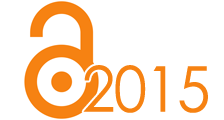Main menu
You are here
Time To Use Open Access Already
Plenty of high school discussions are easily forgotten, but I was just reminded of one from 2007. A bunch of us knew we would soon be taking science courses in university, but we were asking whether it was best to stay in the field or move onto something more applied. One thing I said was "I will keep doing research as long as I can put all my articles online for free." A friend of mine who has always been very well informed replied with "don't count on that." At the time, it was not clear whether a scientific career could reasonably follow that philosophy. But now I am thankful to say that it can. The friend I mentioned and I are both contributing papers to Open Access repositories and millions of people have joined this movement in recent years.
Last month, my campus had a symposium on some of the Open Access efforts happening in the surrounding area. I signed up as soon as I saw that it was kicking off with a documentary on Aaron Swartz. When people there heard that I was one of the school's physicists, they applauded us for being early adopters. This is a clear reference to the arXiv — the primary source for everyone in my field, which has turned publication into a pure formality. I cannot really imagine only learning what an author has been up to after peer review has finished. Another physics success story (ranked surprisingly highly for something I only learned about two years ago) is Living Reviews in Relativity.
But of course the talks did more than just suck up to these projects and bash Republicans. They taught me a few things about the journal ecosystem including areas where physics is no longer in the lead.

A lot of the presentations dealt with medicine... probably the field most famous for benefiting more than just academics. In fact they told me that more than half of the viewership of PubMed Central is now coming from laypeople. One of the people who seemed to be on the forefront of Open Access medicine was Gary Ward, the chairman of the PLoS family of journals. Since the Public Library of Science has become so popular, they now have enough bargaining power to change the culture of some people who are against releasing data. Their latest requirement to have raw data posted with each paper faced some initial resistance but the journals have continued to grow. Since it is free to read, PLoS charges a fee when articles are first published. This is common to all Open Access journals I have seen except JHEP. Gary said that he has always been able to get this fee reimbursed by funding agencies and told us that we would need a better excuse to publish somewhere else. One other notable part of his presentation was the claim that impact statistics for various journals seem to be gamed. By deciding when to use the mean and when to use the median, Nature and Science are able to seem more "highly cited" than they really are. More scrutiny reveals that reviewers are not always "crystal balls" who predict which papers will be the most interesting ahead of time. Something that tries to aggregate the predictions of many researchers is F1000 Prime. I'm not sure if it is designed for students, but maybe we are not the only ones who need help filtering huge lists of papers into something that can be read in a lifetime.
GitHub was mentioned a few times and all the talk about metrics reminded me of their interface for assessing the popularity of a project (if not statistics about the lines of code). I signed up for GitHub this year instead of three years ago because I wanted my joining to coincide with a flurry of contributions. Something else I should probably sign up for is the Wikipedia Library. This can give you access to many repositories that aren't normally free if you make a case about why you need them for editing the wiki. Something that caught my eye was the fact that Elsevier had decided to help this project like a stopped clock. Upon further reading, I saw that this was a source of controversy by itself. See the perfectly phrased question: is Wikipedia an open access summary of knowledge or a summary of open access knowledge?. In all honesty, getting information into a Wikipedia article is not that hard. The hard part is getting one's hands on free multimedia contributions. Millions of articles that could easily have pictures do not include them because all photographs are copyrighted by default. Filtering a Google image search by license is usually fruitless because all of the freely licensed images that show up already come from Wikipedia. I recently found an exception to this. It was a picture of ISIS chan from Deviant Art, which I added to the corresponding article.
So what's next for Open Access? Well some people at the symposium were talking about ways to move away from PDF files and use something that's meant to be continuously updated. Their demos looked fancy but I can't see anyone taking the time to put all of his or her data into some virtual reality format when there is more research to be done. I think the best strategy is just to make full use of what others post. Cite papers that you know to be good before random reviewers announce that they are good. Tweak another group's experiment to have its results understood better. And if you don't consider yourself a scientist, trying going to the original source the next time you want to answer a hard question. If someone has put a detailed study online for free, spreading it around sends a vote of confidence that you want more stuff like that.
